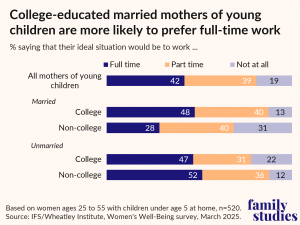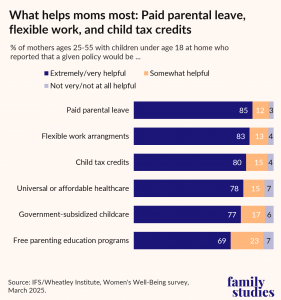New IFS Report Identifies What Mothers Want On Work and Family
Paid Parental Leave, Flexible Work, and Child Tax Credits Emerge as Top Policy Priorities for U.S. Moms
CHARLOTTESVILLE, VA, UNITED STATES, November 20, 2025 /EINPresswire.com/ -- A new report from the Institute for Family Studies (IFS), authored by Wendy Wang and Jenet Erickson, reveals a striking shift in the labor force participation of American mothers—particularly married mothers with children under age five. Despite recent fluctuations in women’s employment, the long-term trajectory shows that more married mothers of young children are working full time than ever before, even though full-time work is not the preferred option for most.**Rising Employment Among Married Mothers With Young Children**
See Figure 1.
The report shows that mothers with children under age five—historically the least likely group to be in the workforce—have experienced an overall rise in employment over the past two decades. This increase is driven entirely by married mothers, who make up three-quarters of mothers with preschool-aged children.
Among prime-age married mothers with children under five, labor force participation has risen from 63% in 2000 to 69% in 2025. Over the same period, participation among unmarried mothers with young children has declined from 75% to 70%.
The growth in employment among married mothers is powered by full-time work. In 2024, for the first time on record, married mothers with young children were more likely than unmarried mothers to work full time (56% versus 54%). Although that share dipped slightly in 2025, the two groups remain equally likely to be full-time earners today.
**What Mothers Actually Want: Flexibility Above All**
Despite the rise in full-time employment, full-time work is not the ideal arrangement for most mothers—especially married mothers of young children. According to a recent IFS/Wheatley Institute survey of 3,000 women ages 25–55:
- Only 39% of married mothers with children under five say their ideal is full-time work.
- 40% prefer part-time work.
- 20% would prefer not to work for pay at all.
Across all mothers with children under 18, fewer than half (47%) prefer full-time employment.
See Figure 2.
Education plays a significant role: nearly half (48%) of college-educated married mothers with young children say full-time work is ideal, compared with just 28% of those without a college degree. Both groups are equally likely to prefer part-time work.
One of the largest gaps the study identifies is between mothers’ preferred work arrangements and their actual circumstances. While 80% of mothers who prefer full-time work are doing so, only 30% of mothers who prefer part-time work are able to find it.
**Policy Priorities: Paid Leave, Flexibility, and the Child Tax Credit**
See Figure 3.
A majority of mothers—60%—say the government is not doing enough to support parents. Their top priorities are:
1. Paid family and parental leave
2. Flexible work arrangements
3. A strengthened child tax credit
Policy preferences vary by income. Middle- and higher-income mothers place greater emphasis on paid leave and workplace flexibility. Lower-income mothers are more likely to prioritize the child tax credit.
Government-subsidized childcare, while viewed as helpful, does not rank among mothers’ top priorities—especially compared to policies that give families more time and financial stability.
**Support Networks Still Center on Family**
The study also highlights where mothers actually turn for help. Spouses or partners are the primary source of support (74%), followed by extended family (64%). Paid childcare is more limited (39%), and neighbors rank lowest.
NOTES
Wendy Wang, Jenet Erickson, “More Married Mothers of Young Children Are Working Full Time,” (Institute for Family Studies, November 20, 2025).
Authors
Wendy Wang is Director of Research at the Institute for Family Studies. She formerly served as a Senior Researcher at the Pew Research Center.
Jenet Erickson is a Senior Fellow at the Institute for Family Studies, a Fellow of the Wheatley Institute, and Associate Professor in Religious Education in the School of Family Life at Brigham Young University.
About the Institute for Family Studies
The Institute for Family Studies is a nonpartisan research organization dedicated to strengthening marriage, family life, and the wellbeing of children through rigorous social science research.
Christopher Bullivant
Institute for Family Studies
email us here
Visit us on social media:
LinkedIn
Facebook
YouTube
X
Legal Disclaimer:
EIN Presswire provides this news content "as is" without warranty of any kind. We do not accept any responsibility or liability for the accuracy, content, images, videos, licenses, completeness, legality, or reliability of the information contained in this article. If you have any complaints or copyright issues related to this article, kindly contact the author above.



